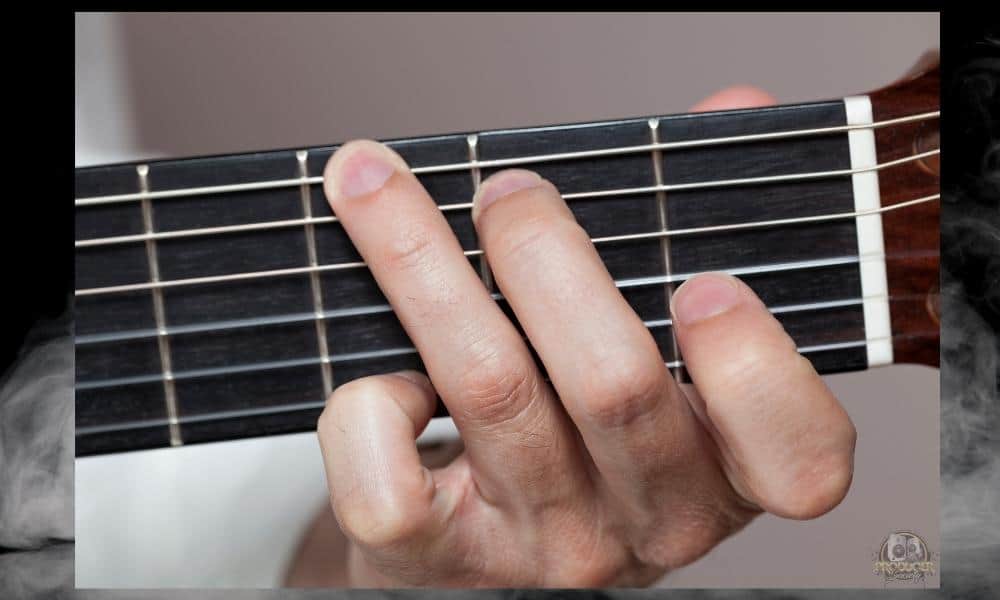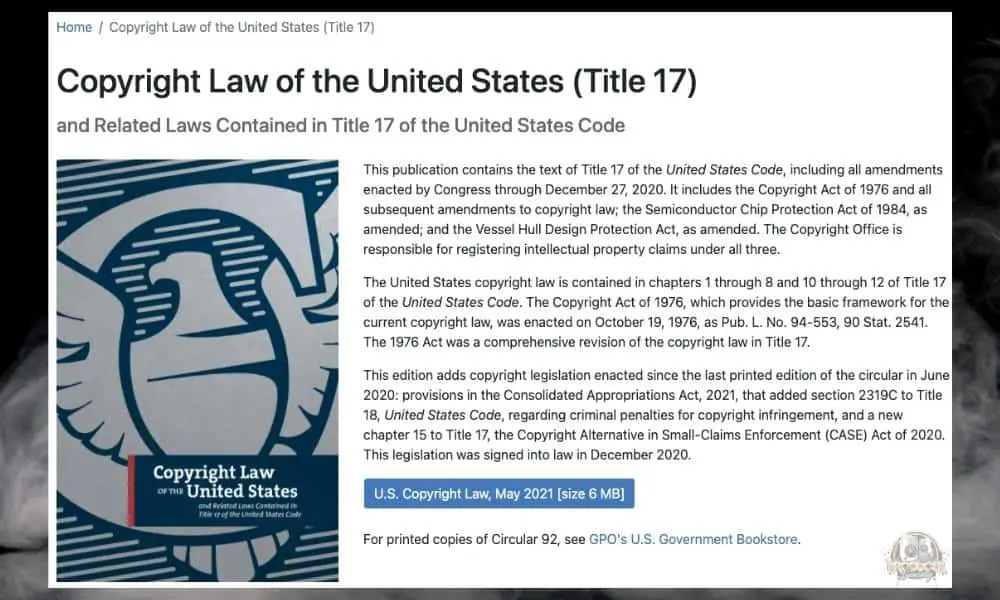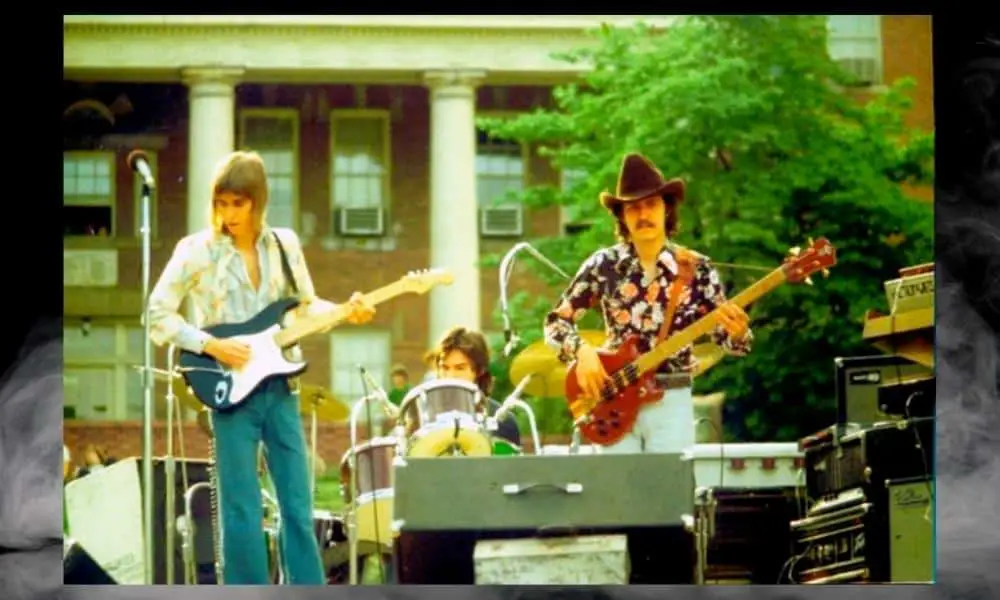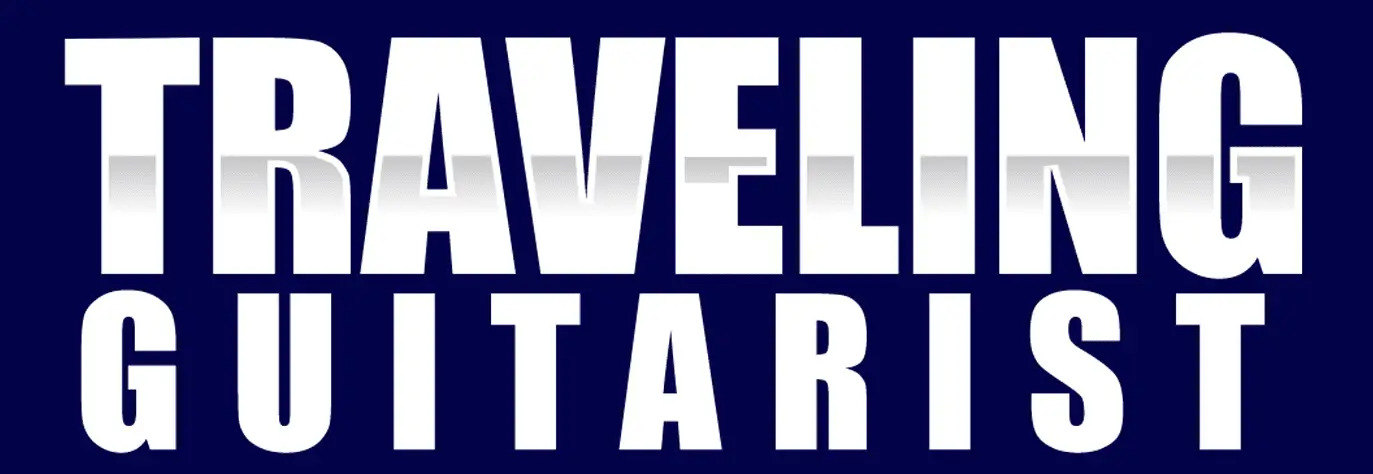So, you’ve spent countless hours mastering the guitar and stumbled on what sounds like the most beautiful chord imaginable. You try to figure out the intervals for it to name it but you just can’t get it.
And you can’t find a name for it online either. This begs the question: Did you create it? What’s more – can you officially copyright it? Well, not quite.
A single chord cannot be copyrighted under United States Copyright Law, however, a complete musical composition can. A chord has to be part of a holistic musical idea, usually alongside a melody, chord progression, rhythm, and lyrics.
According to Music Business Worldwide, artists upload 60,000 songs to Spotify every day, and there are hundreds of millions of songs already released. You’d be hard-pressed to find a 100% original song in every aspect. That’s why copyright law has an element of ambiguity built into it for music. I’ll expand on what I mean by that now.
Why A Single Guitar Chord Can’t Be Copyrighted

The notorious copyright case involving Ed Sheeran and Marvin Gaye’s estates has shed light on the nuance and complexity of copyright law. EDIT: Ed Sheeran won the case!
According to Reuters, the debate surrounded the chord progression and groove that Sheeran’s “Thinking Out Loud” seems to have borrowed from Gaye’s “Let’s Get It On.”
This highlights the importance of understanding which elements of a song are protected by copyright, and why a single chord cannot be protected. So if you’re worried about being sued for using chords, then my article on not using them won’t be of interest.
I think the best way to explain it is the following:
1) Music Copyright Law Protects Complete Musical Ideas

According to their site, the US Copyright Office defines a musical composition primarily as containing melody, rhythm, and harmony. It may also include accompanying lyrics, which a composer can write in a system of musical notation.
Under this definition, it is easy to see why a chord, individually, is not considered a musical composition. For one, a chord on its own with no timing, rhythm, or musical context at all isn’t a complete musical idea.
Even if the artist plays the chord repeatedly on its own, the parts of that song that would render it distinctly protected under copyright law would be the other elements such as the groove, the melody, and the rhythm, rather than the chord itself.
I talked about “complete musical ideas” before in my article on the difference between a lick and a riff, in case you’re interested (also this one on guitar licks).
2) To Copyright Chords Would Limit the Creative Freedom of Artists
![Artist in Jail - Can A Guitar Chord Be Copyrighted [ANSWERED]](https://travelingguitarist.com/wp-content/uploads/2022/02/Artist-in-Jail-Can-A-Guitar-Chord-Be-Copyrighted-ANSWERED.jpg)
A chord in a song can be likened to a basic ingredient, like salt or water, in a cooking recipe. I think what I said earlier explains it best: a chord isn’t a complete musical idea. It’s just a part of it.
Chords are as fundamental to music and harmony as water is to life, and nobody technically owns the concept of water. It’s easy to see why the contrary would lead to a challenging situation.
In the same way, requiring an artist to get your permission before they’re able to use a basic component of a song would have ridiculous implications for the future of music.
Firstly: this could mean that an artist would not be able to publish a song they’ve written because they wouldn’t have the rights to one of the simplest parts.
Secondly: there would cease to be any new original music. If every chord in existence is owned, and every song requires at least one chord, then all new songs would be owned by whoever owns the chords.
And lastly: It would be terribly difficult to prosecute in a court of law. Such a predicament would jam up the courts with accusations of plagiarism – and with no end in sight. Frankly, it’s just not practical and its real-world application would be a nightmare for everyone.
And really, I think this is probably the primary reason why no one has tried to claim they own a single chord. The legal implications of this type of situation would probably be insane.
Although they’re not completely related, it reminds me of the statute of limitations. One of the reasons they exist is that it stops frivolous cases from popping up 20 to 30 years later.
At that point, all of the documents are gone, eye-witness testimony is basically useless, and so on and so forth.
3) You Can’t Invent A New Chord (Although A New Voicing Is Possible)

This one is debatable because what sounds good is largely subjective. A musician could play the most dissonant-sounding chord ever that’s never been played and say they invented it. And technically, they could be right.
While an artist can create a unique combination of melody, lyrics, rhythm, harmony, and a chord progression to produce an original song, the Western music system has done a fairly good job of notating chords.
There are only 12 notes, and they’ve remained the same in the system for centuries. Thus, every conceivable chord that’s possible to create, fits into that system and has been played by artists for a while.
If one were to copyright a seldom-used chord, what would happen with the already existing chords? To whom would we attribute the open D Major chord? Nobody in this century or the last one could take credit for it.
This would create two potential situations: Either all the commonly known chords would remain in the public domain, or protracted legal battles would begin between various entities claiming they have the rights to own such chords.
These are only some of the complications that arise when thinking about the idea of chord copyright. Simply put, it’s not likely to happen, although, I imagine at least someone has tried.
One thing I’d like to discuss again, however, is that it is possible to create an entirely new voicing of a chord. For instance, there are many different ways to play an A Minor chord on the piano.
Another example that comes off the top of my head is altered guitar tunings. A guitarist can get really creative with tunings, and a chord voicing that used to be impossible could suddenly be within reach.
If I’m being honest, this one kind of bugs me because it probably is possible to create a new chord. Although, I think of chords as tools of harmony.
And like a tool – such as a hammer, for instance – I can’t imagine anyone would be able to claim the rights to it. If you don’t agree with me on this, feel free to send me an email explaining why, because I’d be open to hearing about it. Go to my contact page.
Books To Read About Copyright Law and Music
![Copyright Law - Can A Guitar Chord Be Copyrighted [ANSWERED]](https://travelingguitarist.com/wp-content/uploads/2022/02/Copyright-Law-Can-A-Guitar-Chord-Be-Copyrighted-ANSWERED.jpg)
There are many books about the music industry that you could read to get a better idea of how things work in the industry including Introduction to Music Publishing for Musicians.
As I said earlier, the United States Copyright Office website is also useful. Another one that people continuously rave about is All You Need to Know About the Music Business by Donald Passman.
However, I would say the most consumable book I’ve read on the inner workings of the music business (including performances and record contracts), is Richard Schulenberg’s Legal Aspects of the Music Industry: An Insider’s View.
I believe the latest edition of Schulenberg’s book is from 2004, however, there is still a lot of useful information in there. He touches on all kinds of things, including publishing rights, a bit of copyright, riders, and record contracts.
I believe I first got the idea to read that book from DJ Pain who had a series of good videos a while back about copyright and sample clearing. Here’s a good one from DJ Pain.
Important Things to Note About Copyright And Progressions
1) You Can Copyright A Recording Of Yourself Playing A Single Chord
This is one of those situations where the law gets so ambiguous and unclear. While the structure of a chord can’t be copyrighted, it’s possible for you to copyright a recording of yourself playing a particular chord.
This is because there are two types of copyright that exist under US law. The first is regarding the actual composition, and the second is regarding the sound recording of a musical work.
You might not have written the song “Wonderwall,” but you can certainly record a cover version of yourself and own the rights to that recording.
Although, you would probably have to get a license to use the song if you intended to make money from it. This topic makes me think of sample packs from producers, which contain recordings of common chords.

 Written By :
Written By :